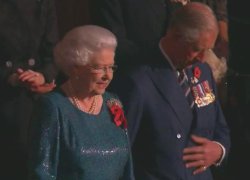 November is the sombrest month. As the leaves complete their fall, we Brits go through two very different but very British annual events, Remembrance and Children in Need. Both have at their heart charitie, in the King James sense of the word, but the tone of each could not be more different. On the BBC, Remembrance commentary comes from National Treasures, Huyuwoo Wedwards and Dimblebug D currently standing in, while Children in Need is forever stamped with the ebullience of a National Buffoon, one Terry Wogan. Heaven forbid that, in the current rush – 1459 comments – to secularise Remembrance, Wogan be ballooned in to Remembrance, or, for that matter, Wedwards be wheeled in to Children in Need. Instinctively, we know neither would do; instead, each to his time and place. Wogan’s 1978 Eurovision commentary, caught all those years ago by Clive James, ‘not by any means full’, simply wouldn’t do at the Royal Albert Hall. Neither would the second half of the phrase, ‘possibly for security reasons’, given that most of what is left of our Armed Forces, and a good few fierce looking Veterans armour-plated with medals and bristling with whiskers if not weaponry, were packed into the Hall for the night. Any sharp-shooters dropping by could be sure of a hot reception.
November is the sombrest month. As the leaves complete their fall, we Brits go through two very different but very British annual events, Remembrance and Children in Need. Both have at their heart charitie, in the King James sense of the word, but the tone of each could not be more different. On the BBC, Remembrance commentary comes from National Treasures, Huyuwoo Wedwards and Dimblebug D currently standing in, while Children in Need is forever stamped with the ebullience of a National Buffoon, one Terry Wogan. Heaven forbid that, in the current rush – 1459 comments – to secularise Remembrance, Wogan be ballooned in to Remembrance, or, for that matter, Wedwards be wheeled in to Children in Need. Instinctively, we know neither would do; instead, each to his time and place. Wogan’s 1978 Eurovision commentary, caught all those years ago by Clive James, ‘not by any means full’, simply wouldn’t do at the Royal Albert Hall. Neither would the second half of the phrase, ‘possibly for security reasons’, given that most of what is left of our Armed Forces, and a good few fierce looking Veterans armour-plated with medals and bristling with whiskers if not weaponry, were packed into the Hall for the night. Any sharp-shooters dropping by could be sure of a hot reception.
One of the more touching moments, at least for this viewer, in last night’s Festival of Remembrance came at the end, as the Queen and her party got up to go. As a blonde bombshell bobbed in the background, the camera zoomed in on the Queen and the heir to her throne. The latter looked nervous, fretting alternately about his waistline and his future, making his signature knuckle to nose gesture, and looking down, quite literally, on his future subjects, as if they might be something not altogether pleasing the dogs had brought in. The Queen on the other hand smiled and waved, and it seemed as if, in spirit if not in physical person, she was one of and within her people. The Windsors are not known as a warm family – may perhaps explain some of the Norfolk tendency among some of her kids, though others suspect genetic engineering may be to blame – but in the wider family of her Armed Services, the Queen was at once both at home and at one.
This is the essence of Remembrance. Ask not for whom the bell tolls. We who yet shall live are at one with those who died, for it is but the mirror of fate that reflects on which side we stand. We, who remember, in that remembering keep alive the memory of those who are no longer are with us. The conflict, be it just or futile, a politician’s whim or a necessary war, is neither here nor there. Our thoughts lie instead with men and women who were killed or injured in service. At the dying of the light, and in the morning, we shall remember them.
Now and then during the Festival, padres popped up, as if from a trap door in the floor, and said their bit before disappearing again into the under-stage. These were the grim handymen, injecting a bit of Polyfilla in the cracks, hoping it might cover things up. For those who are cracking up, and in want of some religious filler, that’s fine. But remembrance is bigger than that. It goes beyond any or no religion, because it affects us all, whether we are or are not of religion, of any or none. Though led by religion, it is not of religion. The Festival – mark the word – is of the Armed Services, and the wider family that stand beside them to remember those who have fallen in war. Today may be Remembrance Sunday, but yesterday’s Festival was on a Saturday, and Remembrance Day this year is on a Tuesday: proof, were it needed, that the Church has joined Remembrance, not created it.
Dylan Thomas urged rage against death, others weep for it. There is a time for anger, a time for sorrow. But in November, we remember. The most famous lines of remembrance, written a hundred years ago, contain no revealed God, no visible religion, just remembrance. Age cannot wither those words, nor custom stale, for we shall remember:
They shall grow not old, as we that are left grow old:
Age shall not weary them, nor the years condemn.
At the going down of the sun and in the morning,
We will remember them.
